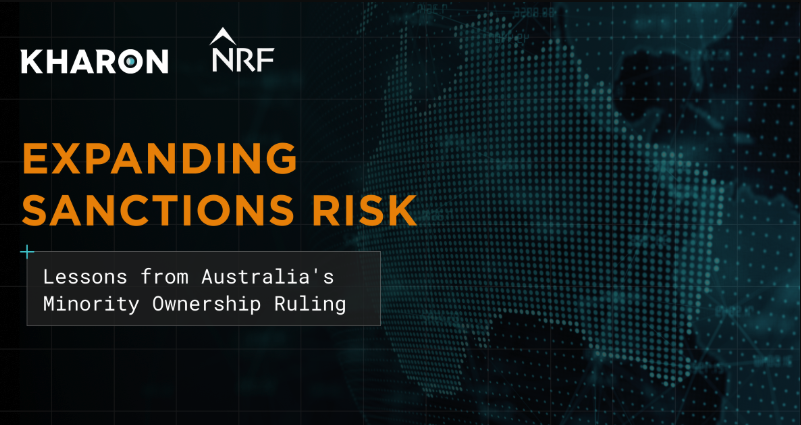Australian courts have significantly tightened ownership rules for the country’s sanctions enforcement over the past year, in dismissing a lawsuit and subsequent appeal by a Russian aluminum giant.
While the U.S. Treasury’s Office of Foreign Assets Control (OFAC), the EU and the U.K. enforce sanctions for 50% or 50%-plus designated ownership, Australian courts’ rulings in the United Co. Rusal cases set a far lower threshold for liability.
“You should be left under no doubt that this interpretation leaves Australia’s sanctions laws to be much more burdensome on those who must comply, at least with respect to the designated entity provisions, than those of the U.K., the U.S. and Europe,” Adam Ruff, general manager for sanctions risk management at National Australia Bank, said during a Kharon webinar this week.
The ruling centered on the involvement of two designated Russian businessmen, Oleg Deripaska and Viktor Vekselberg, who had 30% and 12% effective financial interests respectively in Rusal. That interest, the court ruled, was enough for Australia’s sanctions to take force against the company and its subsidiaries.
Business with either — in this case, the delivery of alumina to a Rusal subsidiary — could directly or indirectly benefit Russia, the Australian court said, and would constitute a sanctions breach.
“The implications of this decision do seem clear in that the bar has lowered, and you could blame Victor Vekselberg for that and his effective financial interests of 12%,” said Charles Nugent-Young, a senior adviser in risk advisory for Australia’s Norton Rose Fulbright. “But it seems as if that’s very much the bar at this point in time.”
Companies with business in Australia will need to do more now, Nugent-Young and Ruff said, to manage their risks.
The webinar, hosted by Dane Shelly, Kharon’s head of Asia, was titled “Expanding Sanctions Risk: Lessons from Australia's Minority Ownership Ruling.”
The backstory: Queensland Alumina Ltd. (QAL) was a joint venture between the Rio Tinto group (with 80% ownership) and Rusal (20%). As part of the agreement, Rio Tinto would supply bauxite to a Rusal subsidiary, Alumina and Bauxite Company Ltd. (ABC).
But after the Australian government implemented sanctions against Russia, Deripaska and Vekselberg in March 2022, QAL invoked force majeure provisions and stopped supplying bauxite or shipping services to ABC to comply. Rusal sued.
The Australian courts ruled and later upheld that Rio Tinto had correctly interpreted the country’s sanctions laws, which the supply of bauxite and alumina to Rusal would violate. At least some of the alumina, the evidence suggested, ultimately would have ended up in Russia and been to its benefit.
Another key ruling: that the alumina production also would have benefited Deripaska and Vekselberg, the sanctioned Rusal minority owners. And that would be a violation of Australian sanctions, too.
Soundbite: “Certainly anyone who only screens the entities on the list, first of all, is probably in a problematic position,” Ruff said during the webinar. And if you’re “only screening to 50%, the QAL decision is probably a wake-up call that you need to do more.”
Takeaways: The court, Nugent-Young noted, referred to the “potential” for a de minimis ownership threshold, but it didn’t set one. “It may make a lot more sense [for businesses] to proceed on the basis of 10%, but that does seem to be very much the threshold that has now been set,” he said.
One practice that he recommended was to reassess what controls your business has in place, “to ensure that those goods are not going to end up somewhere that they’re not allowed to be, even indirectly.”
Ruff advised that compliance officers expand their approach to due diligence when assessing risk. Going forward, he said, it will have to mean not only setting a threshold but “getting all of the right information in front of you, mapping it out [and] calculating the percentages.”
“[When] you’re faced with a potential transaction with a party in an interesting part of the world that your organization doesn’t usually deal with, it’s harder to know which corporate records are trustworthy and which are not, which are current and which are not,” Ruff said. He cited the cascade of ownership changes that can follow the designation of an indirect beneficial owner.
The bar is high for establishing a defense under Australia’s sanctions-enforcement laws, Nugent-Young said. The court rulings mean, then, that businesses will need to be more thorough in investigating their supply chains than ever.
“It can just put you in the best possible position,” Nugent-Young said, “if something does go wrong.”
While the U.S. Treasury’s Office of Foreign Assets Control (OFAC), the EU and the U.K. enforce sanctions for 50% or 50%-plus designated ownership, Australian courts’ rulings in the United Co. Rusal cases set a far lower threshold for liability.
“You should be left under no doubt that this interpretation leaves Australia’s sanctions laws to be much more burdensome on those who must comply, at least with respect to the designated entity provisions, than those of the U.K., the U.S. and Europe,” Adam Ruff, general manager for sanctions risk management at National Australia Bank, said during a Kharon webinar this week.
The ruling centered on the involvement of two designated Russian businessmen, Oleg Deripaska and Viktor Vekselberg, who had 30% and 12% effective financial interests respectively in Rusal. That interest, the court ruled, was enough for Australia’s sanctions to take force against the company and its subsidiaries.
Business with either — in this case, the delivery of alumina to a Rusal subsidiary — could directly or indirectly benefit Russia, the Australian court said, and would constitute a sanctions breach.
“The implications of this decision do seem clear in that the bar has lowered, and you could blame Victor Vekselberg for that and his effective financial interests of 12%,” said Charles Nugent-Young, a senior adviser in risk advisory for Australia’s Norton Rose Fulbright. “But it seems as if that’s very much the bar at this point in time.”
Companies with business in Australia will need to do more now, Nugent-Young and Ruff said, to manage their risks.
The webinar, hosted by Dane Shelly, Kharon’s head of Asia, was titled “Expanding Sanctions Risk: Lessons from Australia's Minority Ownership Ruling.”
The backstory: Queensland Alumina Ltd. (QAL) was a joint venture between the Rio Tinto group (with 80% ownership) and Rusal (20%). As part of the agreement, Rio Tinto would supply bauxite to a Rusal subsidiary, Alumina and Bauxite Company Ltd. (ABC).
But after the Australian government implemented sanctions against Russia, Deripaska and Vekselberg in March 2022, QAL invoked force majeure provisions and stopped supplying bauxite or shipping services to ABC to comply. Rusal sued.
The Australian courts ruled and later upheld that Rio Tinto had correctly interpreted the country’s sanctions laws, which the supply of bauxite and alumina to Rusal would violate. At least some of the alumina, the evidence suggested, ultimately would have ended up in Russia and been to its benefit.
Another key ruling: that the alumina production also would have benefited Deripaska and Vekselberg, the sanctioned Rusal minority owners. And that would be a violation of Australian sanctions, too.
Soundbite: “Certainly anyone who only screens the entities on the list, first of all, is probably in a problematic position,” Ruff said during the webinar. And if you’re “only screening to 50%, the QAL decision is probably a wake-up call that you need to do more.”
Takeaways: The court, Nugent-Young noted, referred to the “potential” for a de minimis ownership threshold, but it didn’t set one. “It may make a lot more sense [for businesses] to proceed on the basis of 10%, but that does seem to be very much the threshold that has now been set,” he said.
One practice that he recommended was to reassess what controls your business has in place, “to ensure that those goods are not going to end up somewhere that they’re not allowed to be, even indirectly.”
Ruff advised that compliance officers expand their approach to due diligence when assessing risk. Going forward, he said, it will have to mean not only setting a threshold but “getting all of the right information in front of you, mapping it out [and] calculating the percentages.”
“[When] you’re faced with a potential transaction with a party in an interesting part of the world that your organization doesn’t usually deal with, it’s harder to know which corporate records are trustworthy and which are not, which are current and which are not,” Ruff said. He cited the cascade of ownership changes that can follow the designation of an indirect beneficial owner.
The bar is high for establishing a defense under Australia’s sanctions-enforcement laws, Nugent-Young said. The court rulings mean, then, that businesses will need to be more thorough in investigating their supply chains than ever.
“It can just put you in the best possible position,” Nugent-Young said, “if something does go wrong.”

Click here to watch the webinar on-demand.







